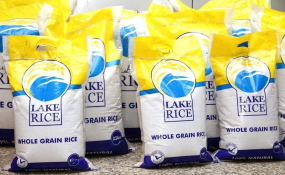By Abu Najakku
Kebbi is in the news again but this time it is not the story of mass failure in school certificate examination, neither is it about placing last in the national sports festival. It is positive news. It is about the advent in the Lagos mass market of one of the newest brands of the outgoing year popularly known as the Lake Rice.
Notwithstanding the imported brands they have always craved for, I am sure that Lagosians will enjoy the taste of the Lake Rice. Lagos is a ready market for almost every grain of rice that Kebbi can produce. There is no doubt that President Muhammadu Buhari’s government will be well pleased with the Lake Rice as a brilliant example of how to produce at home what we need and steer clear of imported food. We may import tractors but certainly, we have no reason to continue to buy foreign rice, considering that God has endowed us with such fertile land. From time immemorial, rice has been cultivated in the Fadama located all the way from Argungu to Yauri. The Fadama is the black muddy soil that occurs mostly at the bank of the tributaries of River Niger and very suitable for the cultivation of rice.
Lake Rice, contained in attractively branded blue and yellow sacks, has come to be, through the productive memorandum of understanding between Kebbi and Lagos states. Lake Rice is essentially rice cultivated in Kebbi, milled and bagged in Imota, Lagos, for the eating pleasure of consumers in the country’s commercial headquarters. Lake Rice, the stunning end result of the Lagos-Kebbi partnership, reinforces the argument that federal government should place or maintain ban on rice imports. Almost every family in Lagos tasted the Lake Rice this Christmas. It provided good alternative to imported expired rice piled up for several years in foreign warehouses.
Rice has been cultivated in Kebbi for as long as one can remember; actually, until a few years ago, tuwon shinkafa or mashed rice was the commonest dinner among the people. Just about thirty years ago, upon harvest, rice farmers could concede their farmlands to old women (‘yan share) to sweep the residue for their own use. From the dregs alone, the old women were known to have made several bags of rice for themselves. In those days, there was so much rice that fura, a common meal, could be made entirely of the produce. But gradually, the rice farmers abandoned their farms, came to town and began to look for security; gardening and other jobs not only because cropping had become laborious but also because they could no longer afford the inputs. Bakin iri, Bayawure, Dan kyanga, Dan Musa, Jan iri, Mai adda, ‘Yar butuka, ‘Yar kalgawa, etc. were all varieties of the rice farmed in Kebbi.
Nevertheless, indigenes of Kebbi have repeatedly said they are unable to see and purchase Lake Rice in Birnin Kebbi or anywhere around the state. It will appear then that the rice is customised for Lagos citizens only. People need additional information about the Lake rice especially in terms of figures: how many tonnes have been sold in Lagos? What is the worth of the deal and who are the beneficiaries?
People are also demanding to know why the rice cannot be milled in Kebbi and pushed to Lagos ready-made? They also ask: how long will the collaboration last or has the venture come to stay? Is the supply of Lake Rice to Lagos sustainable? What happens to the half a dozen states located between Lagos and Kebbi whose citizens also yearn for the product?
There is no doubt that the people of Kebbi have hearkened to President Muhammadu Buhari’s call on them to return to the farm and produce, rice, wheat, etc. to help the country eliminate the need to import them. Clearly, the country has a huge appetite for these commodities.
But thanks to the anchor borrowers’ programme launched by the President in Birnin Kebbi in November 2015, many people have earnestly returned to the farm. Stories abound in Kebbi now of how former thugs and professional beggars have successfully farmed rice and made money for themselves. The anchor borrowers’ programme targets small and medium sized farmers who are normally given fertiliser, improved seeds, water pumps and farming advice by agricultural extension workers. They are also given small amount of money to service the water pumps and settle some incidentals. With the President’s promise to devote more money to agriculture in the 2017 budget, there is every possibility that production will at least double.
Whatever it is, Lake Rice has raised the profile and reputation of Kebbi as a serious rice producing state. The Lagos-Kebbi food production and supply template could be a model for other states to emulate and improve the economic wellbeing of their citizens. It is a big plus for the agricultural revolution that the All Progressives government at the centre wants to unleash. If the Lake Rice venture succeeds, it will validate the President’s declaration that we shall soon come out of recession and also diversify our economy using agriculture. More so, at the end of every harvest, new lessons will have been learnt about how to correct the observed lapses and maximise production.
The President is so elated with the Lake Rice phenomenon that he was quoted as saying “what the two states (Lagos and Kebbi) have done is evidence of a new base being laid for the Nigerian economy, founded and propelled by agriculture, away from substantial dependence on oil and gas for national revenue.”
The Lake Rice enterprise is an exciting and flamboyant demonstration of how production meets consumption and the credit goes to Governors Atiku Bagudu and Ambode Akinwumi and their people.

